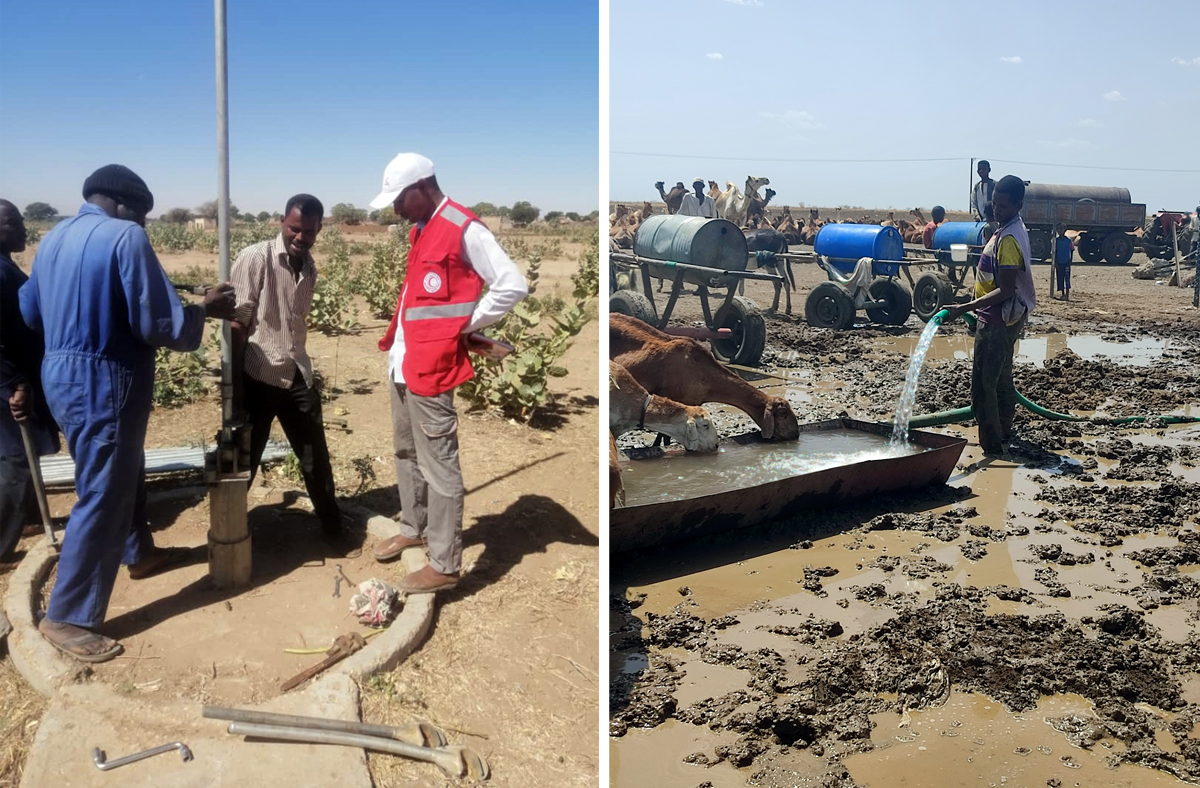Reading time 5 minutes
GEMS OF HOPE
A devastating conflict
Sudan is one of the partner countries of the Netherlands Red Cross. In April this year, conflict erupted between the Sudanese army and the Rapid Support Forces. Meindert Korevaar, Red Cross Coordinator Sudan, Uganda and South Sudan, explains what this means for the aid effort on the ground and for our assistance.
Globally, the Red Cross is present in 191 countries. We call these our sister countries. Despite the sometimes great distance between countries, we are close by to provide assistance. The Netherlands Red Cross has long-term cooperation in place with 12 sister countries. We have a bilateral partnership with these countries. Sudan is the country with which we have had the longest cooperation, for well over 40 years.
Meindert: “I support Sudan, South Sudan and Uganda. These countries are all experiencing a major refugee problem, but how they deal with it is completely different. In September I was in Uganda, visiting some refugee camps there. It is like walking around in small villages. People there are allowed by the government to maintain their own fields and build houses. Very self-sufficient. In Sudan this is very different. There, refugees end up in camps with nothing, not even a small tree.”
This example shows how desolate Sudan is and why the long-standing cooperation with the Sudanese Red Crescent Society is so much needed. "We support people with water and sanitation, projects focusing on climate and, of course, emergency aid, among other things. When we provide aid, we make sure no one is disadvantaged. That is why we involve local communities in addition to refugees. In the partnership, we look at how we can help the society in the long term, so that they become stronger and can do their work even better.”

Latrines and handwashing stations in Gedaref, refugee camp. / Waterpoint for livestock in Kassala
Chronic crises
“We are currently working on a project in Darfur called Chronic Crises," Meindert continued. "The main objective is to provide water and sanitation in places where there is nothing left. The conflict between the army and the Rapid Support Forces changed that. I have seen pictures of the department we work with, there is nothing left of it. Their office has been razed to the ground. Everything was set on fire. That is very sad. So we had to stop the Chronic Crises project. In consultation with the Red Crescent we were able to continue it in another area where the needs are also very high. There it is relatively calm and still workable. Our function is to talk to the money donor and ask permission if we can use the money in a different place than initially mentioned. In this case, we asked permission from the Ministry of Foreign Affairs. Fortunately, we can continue with Chronic Crises.”
“When we provide aid, we make sure no one is disadvantaged”
Conflict
When the conflict broke out, West Darfur and the capital Khartoum, in particular, were no longer safe. "At that time, four colleagues and a number of national staff were present in the country on behalf of the Netherlands Red Cross. The colleagues experienced life-threatening moments. In the end, they were evacuated safely. I am in daily contact with the colleagues who were there first. It is still very tough for them. Especially the feeling of having to leave the country and leaving their Red Crescent colleagues behind. They have witnessed very intense situations.”
Meanwhile, the headquarters of the Sudanese Red Crescent Society has also been taken by the Rapid Support Forces. The society now operates from Port Sudan. Under difficult circumstances, but they continue.
Clean drinking water
“Fortunately, there are also gems that keep you hopeful. Shortly after the conflict began, we received word that some activities were still continuing in refugee camps. At one of the sites, local colleagues had installed solar panels on a well. Previously, this had been done with generators, but since the conflict, diesel is no longer affordable or available. The solar panels provide clean drinking water to over 4,000 people. I was really impressed that they managed to do this under these harsh conditions. This also gave us insights. We are focusing on the departments that can still be operational. They need our support more than ever before.”

Borehole rehabilitated for drinking water in West Darfur
“When I was in Sudan in January 2022, there were many protests against the current government. Students took to the streets every week to protest. Stones were thrown and things got heated. From my room, I looked outside and saw the clouds of smoke from the tear gas the army threw at the students. What struck me was that down the street from my hotel, people were sitting cosily together and drinking tea, while three blocks away the protest was underway. The Sudanese are incredibly nice. When you hear the story about the conflict, your heart breaks. It is such a beautiful country, with a lot of potential, but the conflict is devastating it. That really hurts me a lot. Especially having been there myself.”
Future
For the time being, the situation remains unsafe. "Most of Sudan's partner countries are now operating from Nairobi. This way they are present in the region and can return when it is safe. The conflict has a lasting impact. Before, you could live there with your family if you worked there for an extended period, that is no longer possible. It is sad that it is necessary to support this country for so long. If not for the conflict, we would have focused on climate change. We will now continue that later.”

Distribution of hygiene kits in Gedaref durng the conflcit